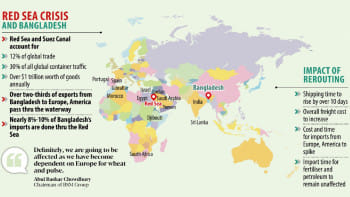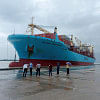Bangladeshi vessels start avoiding Red Sea amid rising tension

Most Bangladeshi oceangoing vessels have started avoiding the Red Sea as part of safety measures since the Houthis launched attacks on merchant ships crossing the route at the end of last year.
Meanwhile, Bangladesh's Department of Shipping issued a circular on January 29 giving a set of transit guidelines for Bangladesh-flagged vessels.
In the circular, the Department mentioned what security measures the vessels should take while passing the Gulf of Aden, Bab al Mandeb Strait, Red Sea and Yemeni coast, the areas mostly attacked by the Houthis.
Azam J Chowdhury, chairman of Bangladesh Ocean Going Ship Owners' Association, confirmed the oceangoing ship operators' decision of not using the risky route.
Ships are facing additional fuel cost for taking longer alternative routes and bearing extra war risk insurance, which are increasing their expenditure, he told The Daily Star.
The merchant ships, particularly those are now seriously threatened which have connections with Israel through business ties like ownership, port calls, commerce, operators, managers and charterers, the circular said.
"However, due to their closeness to a missile or drone attack against another target or because of inaccurate targeting, transiting vessels that are not involved in Israeli trade may likewise be at risk of collateral damage," it alerted.
The Department of Shipping recommended Bangladeshi ships proceed with utmost caution and adhere to its guidelines while operating in the area.
The Bangladeshi vessels need to register with the United Kingdom Maritime Trade Operations and maintain communications round the clock with it and the Combined Maritime Forces through a voluntary reporting scheme, including reporting any incident or suspicious activity, the circular read.
There are 99 Bangladeshi oceangoing vessels mostly bulk careers and oil tankers, including eight container vessels.
Many of the bulk careers and oil tankers very often use the route while plying from Asia to the Europe.
The shipping regulatory body has also asked the Bangladeshi vessels to "undertake a ship- and voyage-specific risk assessment before entering the region".
The assessment should consider factors such as safe speed, day/night transits, bridge manning levels, etc, according to the circular.
It recommended the master of the vessel retain ultimate responsibility for ensuring the vessel's safety and security and should plan routes accordingly.
All stakeholders are advised to adhere to the "Best Management Practices-5" while transiting through this region, it said.
Mohd Meherul Karim, CEO of Chattogram-based SR Shipping, a concern of KSRM Group with 24 oceangoing vessels, told The Daily Star that his company has decided to completely avoiding the route.
Bangladesh Shipping Corporation (BSC) Managing Director Commodore Mahmudul Malek said five of its oceangoing ships are currently plying on different sea routes.
One of the BSC vessels is scheduled to travel from an Asian country to the Europe soon and the vessel's charterer has been asked to refrain from using the Red Sea and take alternative route through Africa's Cape of Good Hope.
Earlier in 2022, a bomb attack at a Ukrainian port damaged Banglar Samriddhi, a ship of the BSC, killing a crew.
Mohammad Abu Taher, general manager of Mercantile Shipping Lines Ltd, a concern of Meghna Group of Industries that owns 22 ships, also said his company's vessels are not using the high-risk war zones, including the Red Sea.

 For all latest news, follow The Daily Star's Google News channel.
For all latest news, follow The Daily Star's Google News channel. 









Comments